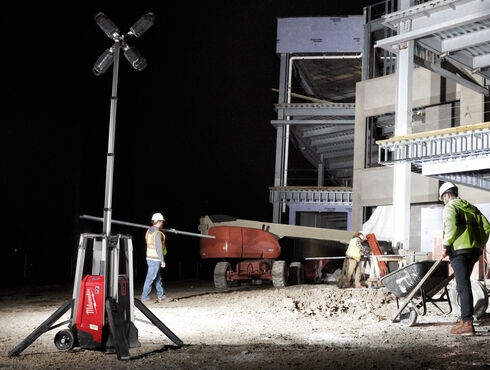
Sustainable Speedy
8 June 2021

What does being green or eco-friendly really mean? That’s what Speedy’s Andy Connor believes hirers should be asking generally regarding their own operations, products from suppliers and customer requirements.
Andy is Speedy’s Group Product Innovation & Supply Chain Director. Next year he celebrates the remarkable achievement of 40 years in the industry and he believes that the challenges and opportunities surrounding sustainability make this the most exciting period yet. However, he wants to see an informed debate based on clear information.
“Customers want sustainable solutions that are practical and affordable,” Andy tells me. “We’re seeing this in the automotive industry with manufacturers constantly announcing new technologies and infrastructure in advance of the ban on new diesel and petrol car sales from 2030. We need to see similar urgency in construction.”
However, Andy believes there is a risk of ‘greenwashing’, or disinformation in some quarters to present an environmentally responsible public image.
“The risk is that promoting sustainability inaccurately could make people ‘anti-engine’. But the engine isn’t the problem: it’s the fuel. True sustainability isn’t about producing a glossy product brochure or ticking a box on a tender document. It involves careful evaluation and informed choices about reducing carbon emissions.
“Some electric machines, for example, are three times as expensive as diesel equivalents, but customers won’t pay a higher rate that reflects that. However, you can run a diesel engine on HVO (hydrotreated vegetable oil) which reduces CO2 emissions by 90%, so surely that’s a more practical, cost-effective solution for most users until better alternatives are available.”
Andy points out that choosing different work methods and equipment can help. (This is similar to the time when HAV legislation was introduced and users began exploring ways of avoiding the use of vibrating tools altogether.)
“Do you really need to use, say, a battery powered material lift? A manually operated platform or pallet truck might allow certain jobs to be done without any need for power at all. Yet, if people don’t regard that as an ‘eco’ solution, it could be overlooked.”
In other words, you have to look beyond slogans and labels. Andy also believes that manufacturers should provide more information about the carbon footprint of products over their whole life, perhaps like the energy performance certificates on white goods.
Speedy has certainly been active in making its own ‘eco’ preparations in terms of its hire fleet and its operations, from premises to vehicles. This is co-ordinated under its sustainability programme, called Energise, part of Speedy’s ESG (environmental, social and governance) strategy to address these obligations, which investors and the public increasingly recognise.
Speedy has a planned procurement strategy for sustainable products. 22% of its asset fleet is already deemed ‘eco’, or consuming less energy than a standard equivalent. This figure will increase to over 65% by December 2024.
Broadly speaking, the purchasing timetable will mirror the expected pace of developments across the various green technologies, concentrating in turn from cordless to hybrid, then solar and hydrogen.
A recent step in Speedy’s cordless procurement programme was its purchase of 300 MX Fuel tower lights (pictured) from Milwaukee. The battery powered work lights will save on fuel costs and carbon emissions compared to diesel driven equivalents.
“It’s also a better way of working,” says Andy. “There’s no need to handle or mix fuel and no engine to maintain. And there’s no pull cord to break, which is the most common cause of breakdown.”
The batteries can also be used to power other MX Fuel tools, giving operational benefits.
Speedy has partnerships in place with other suppliers developing cordless, solar, hybrid and hydrogen powered products.
Andy believes that sustainability requires wholesale attitude changes. “Some hirers have some very old equipment in their fleets that can hardly be considered eco-friendly and are much less productive than modern equivalents. They must develop programmes to replace and upgrade them if they are to take sustainability seriously.”
He adds that the pace of technological change will only accelerate. “Hirers have been familiar with the internal combustion engine for decades but we’re now witnessing its replacement by green alternatives. It’s revolutionary and the industry must act now.”

